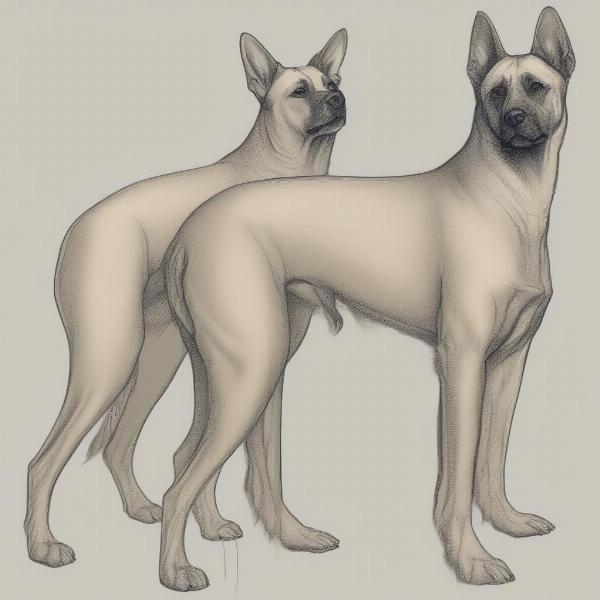The search term “wife takes dog knot” raises questions about canine mating and possibly reflects a misunderstanding of the process. While the phrase itself uses informal and potentially misleading language, it suggests an interest in canine reproduction. This article will clarify the canine mating process, emphasize responsible pet ownership, and address the importance of spaying/neutering.
Canine reproduction is a complex biological process. When a female dog (bitch) is in heat, she releases pheromones that attract male dogs. The “knot” refers to the copulatory tie, a natural part of canine mating where the male’s penis swells within the female’s vagina, locking them together for a period, typically lasting 15-30 minutes. This tie is instinctive and ensures sperm transfer. It’s crucial to understand this is a normal part of canine reproduction, but it requires responsible management by owners. Attempting to separate the dogs can cause serious injury.
Canine Mating: A Natural Process Requiring Responsible Management
Understanding the canine reproductive cycle is essential for responsible pet ownership. A bitch typically goes into heat twice a year, and this period can last for several weeks. During this time, she is fertile and can become pregnant. The mating process, including the copulatory tie, is driven by instinct. Owners need to be prepared and informed to manage this process safely and ethically.
 Canine Mating Process
Canine Mating Process
Misunderstandings about canine reproduction can lead to accidental litters and contribute to pet overpopulation. Spaying or neutering your dog is a crucial step in responsible pet ownership. These procedures not only prevent unwanted pregnancies but also offer numerous health and behavioral benefits.
The Importance of Spaying/Neutering Your Dog
Spaying (for females) and neutering (for males) are surgical procedures that sterilize dogs, preventing them from reproducing. Beyond preventing unwanted litters, these procedures offer significant health advantages. Spaying can reduce the risk of mammary cancer and uterine infections, while neutering can lower the risk of testicular cancer and prostate problems. Furthermore, spaying/neutering can also positively impact a dog’s behavior, potentially reducing aggression, roaming, and marking behaviors.
Responsible Breeding Practices
For those interested in breeding dogs, responsible practices are paramount. This includes careful selection of breeding pairs based on health, temperament, and breed standards. Breeding should only be undertaken by knowledgeable individuals committed to the well-being of the dogs and puppies. It’s vital to consider the significant time, financial commitment, and ethical responsibilities associated with breeding.
What to Expect During the Mating Process
If your dogs mate, it’s essential to remain calm and allow the process to occur naturally. Interfering with the copulatory tie can cause harm. After the tie is naturally released, monitor both dogs for any signs of injury or distress.
Conclusion
Understanding canine reproduction, including the copulatory tie often referred to as the “knot,” is vital for responsible pet ownership. Whether you’re dealing with an accidental mating or considering planned breeding, prioritize the well-being of your dogs. Spaying/neutering is highly recommended to prevent unwanted litters and improve your dog’s overall health and behavior. Responsible breeding requires careful planning, knowledge, and a commitment to ethical practices.
FAQ
- How long does the “knot” last during canine mating? The copulatory tie typically lasts 15-30 minutes.
- Is it safe to separate dogs during the tie? No, attempting to separate them can cause serious injury.
- How often do female dogs go into heat? Usually, twice a year.
- What are the benefits of spaying/neutering? Prevents unwanted litters, reduces the risk of certain cancers, and can improve behavior.
- What is involved in responsible dog breeding? Careful selection of breeding pairs, health testing, and a commitment to puppy care.
- What should I do if my dogs mate unexpectedly? Consult a veterinarian for advice and consider emergency contraception if pregnancy is not desired.
- Where can I find more information about canine reproduction? Your veterinarian or reputable online resources like ILM Dog can provide valuable information.
ILM Dog is your trusted resource for expert advice on all aspects of dog care, from breed selection and health to training, nutrition, grooming, and more. We are committed to providing accurate, practical information to help dog owners worldwide provide the best possible care for their canine companions. Contact us for personalized guidance on any dog-related topic. Email: [email protected] Phone: +44 20-3965-8624. Visit ILM Dog for more helpful resources.